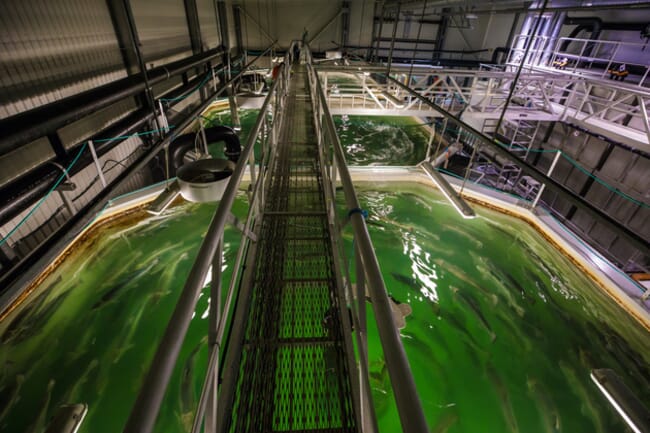
Yet Canada's federal government aim to transition a further 90,000 tonnes of salmon to land-based facilities by 2025 © Terje Aamodt, Nofima
The report was commissioned by the BC Ministry of Agriculture and Food in response to the federal government’s commitment to transition the BC salmon farming sector from open net pens to closed systems by 2025. The province commissioned Counterpoint Consulting Inc in 2021 to provide an economic analysis of farming salmon using RAS technology.
“The salmon farming sector are leaders in RAS technology since our fish spend half their life on land in hatcheries,” said Brock Thomson, innovation director for Cermaq Canada, in a press release. “We are currently trialling new technologies such as semi-closed containment and hybrid systems to systematically reduce interactions with wild salmon and improve fish health. We understand land-based technology, but given the constraints faced, we do not see fully moving to land-based production as a viable solution in the remote, coastal communities where we farm.”
RAS production in BC currently represents less than one per cent of the province's 90,0000 tonnes of farmed salmon production. Moving current levels of ocean farm production to land would require a direct investment of between $1.8 billion to $2.2 billion.
"It is likely that this sort of development could not be accommodated in existing coastal areas, which would result in serious economic impacts to families and all coastal communities up and down Vancouver Island and the Central coast,” added Thomson.
“This report released by the province supports what salmon farmers have been saying for many years,” said Brian Kingzett, executive director of the BC Salmon Farmers Association. “Our sector strongly supports RAS technology – in fact we are experts at using RAS to grow salmon - but to move the entire sector on land isn’t a realistic option, nor is it required to protect wild salmon. The federal government’s numerous science assessments have confirmed Atlantic salmon farms pose no more than a minimal risk to wild salmon abundance and diversity under the current fish health management practices. The challenges identified in the report need to be addressed before we could even consider this.”
The economic analysis also states that the profitable production of market-sized salmon on a commercial scale remains “elusive”. Currently, salmon raised in ocean-based pens are grown to between five and six kilograms, while those raised in RAS facilities are harvested at less than four kilograms in most cases, further making the technology economically unviable, according to the BCSFA,



